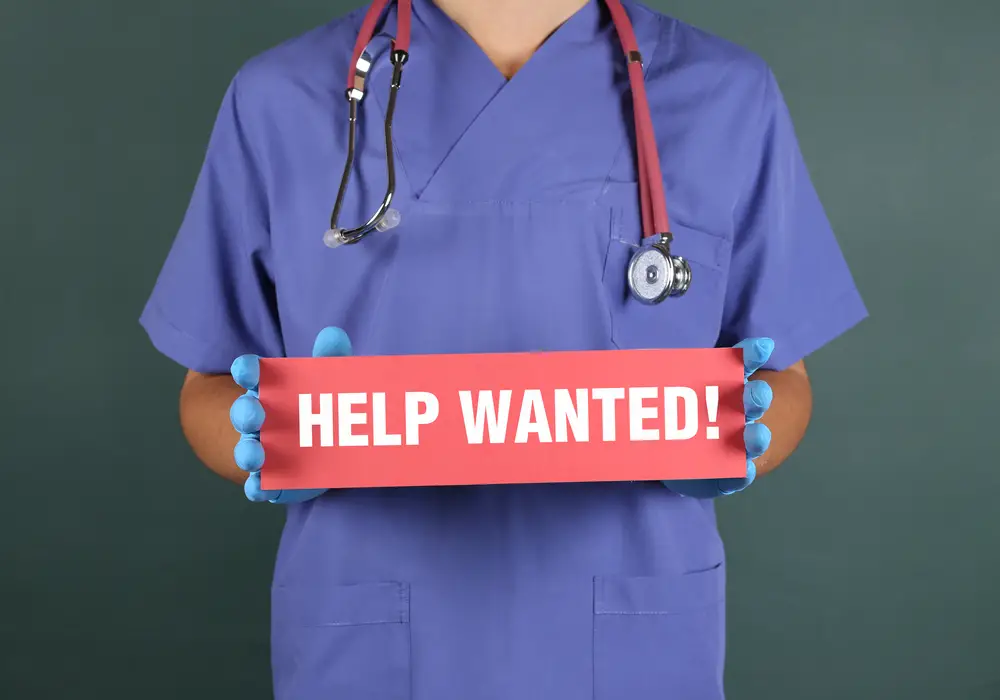Call it the story no one wants to talk about. The already tight labor market is getting worse and worse, driven by several factors, and now most notably by workers who are either quitting or being fired due to refusing a Covid-19 vaccination. The healthcare industry in specific has been hardest hit, with hospitals and care facilities already strapped for workers are now being pressured further with vaccine mandates causing noteworthy labor disruptions among nurses across the country.
It’s not solely attributable to vaccine mandates, though it couldn’t be a worse time to begin enforcing them as Bloomberg reports on several healthcare systems that literally can’t afford to lose a single employee:
Even before the pandemic, nurses and lower-paid aides were in perennially short supply, but the 116-bed facility could still run full, said Chief Executive Officer Michael Krupa. At similar hospitals around Massachusetts, hundreds of beds can’t be filled, and “the reason is exclusively staff,” he said.
What some are calling the worst U.S. health-care labor crisis in memory is sharpening concerns about attrition from resistance to vaccine mandates — even in the medical mecca of Massachusetts, where Covid cases remain well within hospital capacity. About 16% of American hospitals had critical staffing shortages as of Oct. 1, according to the U.S. Department of Health and Human Services.
The uptick initially coincided with a surge in Covid-19 hospitalizations, but shortages have persisted even as the virus ebbs, suggesting other factors.
“We don’t have a single position we can afford to lose right now,” Eric Dickson, president of UMass Memorial Health, told Bloomberg Radio last month. “I have areas that have a 50% vacancy rate. And God forbid we lose any more.”
This is a topic we’ve covered already at length with stories of hospitals forced to pause maternity care, for example, due to nursing staff shortages. The problem here is the double-edged sword of what politicians are trying to accomplish. The goal is to increase vaccination rates, which in turn could drive down Covid hospitalizations, which in turn could reduce the stress on hospital systems, which in turn would mean the staffing crisis could ease somewhat.
All of those dominos need to fall properly to avoid the current situation, which is a system teetering in many areas, now knocked further back in terms of staff shortages due to the vaccine mandate.
The situation is not limited to Massachusetts, of course, it’s all around the country from Virginia to Michigan and parts in between:
In recent weeks, worker shortages have prompted extreme measures, even in regions that aren’t Covid hot spots. In Virginia, five state psychiatric hospitals had to stop accepting patients. A lack of nurses forced Rhode Island Hospital to close part of its emergency department. And a major Michigan hospital chain says 5% of its beds can’t be filled for lack of staff.
As also noted by Bloomberg, a healthcare staffing shortage is quite different than a worker shortage down at Burger King. At the hospital, it means patients can’t be seen in a timely manner or must be turned away, or sent to a hospital outside of the immediate area in the worst circumstances.
Other reports indicate that the number of vaccine holdouts in healthcare is relatively small, but even small numbers can be incredibly problematic to an industry already short on workers:
In California, many major hospitals have reported vaccination rates over 90 percent. In Delaware, the CEO of ChristianaCare, a major health care system, said that only one percent of its 14,000-person staff lost their jobs because of the policy. Over 99 percent of staff at North Carolina-based Novant Health reportedly chose to comply.
These numbers seem to suggest that the number of holdouts is small, which is promising. But even small decreases in the workforce can be disruptive in places where shortages are already serious.
In rural America, for example, vaccination rates are relatively low and hospitals are already understaffed. Losing even just a few employees due to vaccine mandates can mean having to turn patients away.
The lack of nuance when looking at a workforce with a 99% vaccination rate is stunning in some regard. Out of the remaining 1% of workers choosing not to be vaccinated, how many of them already have natural immunity from a previous Covid-19 infection? Why doesn’t that count toward vaccination? After all, several studies conclusively indicate that previous exposure to Covid-19 is as good or better than the coverage provided by a vaccine:
The newly released data show people who once had a SARS-CoV-2 infection were much less likely than never-infected, vaccinated people to get Delta, develop symptoms from it, or become hospitalized with serious COVID-19.
Proof of a previous Covid-19 infection within so many months should be acceptable as a vaccine card when it comes to fulfilling vaccination requirements. Even Sen. Dianne Feinstein included proof of a previous infection as an acceptable way to fulfill her proposal that would require proof of vaccination or proof of negative testing for domestic air travel.
More and more, politicians are starting to acknowledge the basic science of the human immune system.
Much of the labor shortage is being driven by politicians with political goals to pushing vaccination on 100% of the workforce with little regard to the science of natural immunity of legitimate medical reasons for why someone is unable to receive the vaccination.
The heroes of 2020 in the healthcare industry are being turned into villains in 2021 if they do not comply with the top-down vaccine edicts from the local, state, or federal level.
Donate Now to Support Election Central
- Help defend independent journalism
- Directly support this website and our efforts
